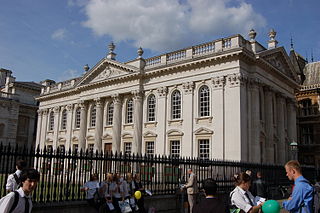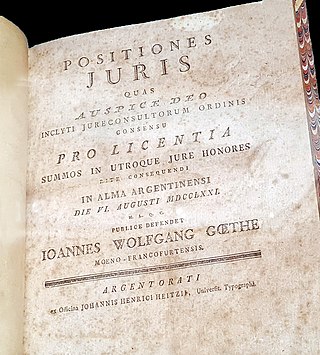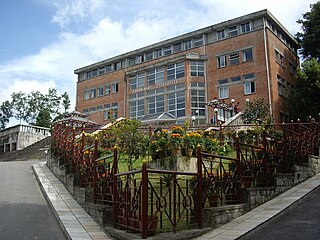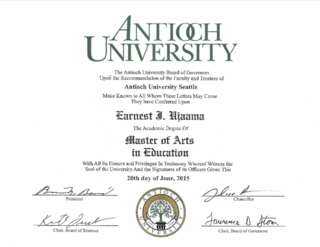Related Research Articles

A Tripos is an academic examination that originated at the University of Cambridge in Cambridge, England. They include any of several examinations required to qualify an undergraduate student for a bachelor's degree or the courses taken by a student to prepare for these. Undergraduate students studying mathematics, for instance, ultimately take the Mathematical Tripos, and students of English literature take the English Tripos.

A Bachelor of Arts is a bachelor's degree awarded for an undergraduate program in the liberal arts, or, in some cases, other disciplines. A Bachelor of Arts degree course is generally completed in three or four years, depending on the country and institution.
An academic degree is a qualification awarded to a student upon successful completion of a course of study in higher education, usually at a college or university. These institutions often offer degrees at various levels, usually divided into undergraduate and postgraduate degrees. The most common undergraduate degree is the bachelor's degree, although some educational systems offer lower-level undergraduate degrees such as associate and foundation degrees. Common postgraduate degrees include engineer's degrees, master's degrees and doctorates.

A master's degree is a postgraduate academic degree awarded by universities or colleges upon completion of a course of study demonstrating mastery or a high-order overview of a specific field of study or area of professional practice. A master's degree normally requires previous study at the bachelor's level, either as a separate degree or as part of an integrated course. Within the area studied, master's graduates are expected to possess advanced knowledge of a specialized body of theoretical and applied topics; high order skills in analysis, critical evaluation, or professional application; and the ability to solve complex problems and think rigorously and independently.
A bachelor's degree or baccalaureate is an undergraduate degree awarded by colleges and universities upon completion of a course of study lasting three to six years. The two most common bachelor's degrees are the Bachelor of Arts (BA) and the Bachelor of Science. In some institutions and educational systems, certain bachelor's degrees can only be taken as graduate or postgraduate educations after a first degree has been completed, although more commonly the successful completion of a bachelor's degree is a prerequisite for further courses such as a master's or a doctorate.

Undergraduate education is education conducted after secondary education and before postgraduate education, usually in a college or university. It typically includes all postsecondary programs up to the level of a bachelor's degree. For example, in the United States, a student pursuing an associate or bachelor's degree is known as an undergraduate student while a student pursuing a master's or doctoral degree is a graduate student. Upon completion of courses and other requirements of an undergraduate program, the student would earn the corresponding degree. In some other educational systems, undergraduate education is postsecondary education up to and including the level of a master's degree; this is the case for some science courses in Britain and some medicine courses in Europe.
An associate degree or associate's degree is an undergraduate degree awarded after a course of post-secondary study lasting two to three years. It is a level of academic qualification above a high school diploma and below a bachelor's degree.
The General Certificate of Education (GCE) is a subject-specific family of academic qualifications used in awarding bodies in England, Wales, Northern Ireland, Crown dependencies and a few Commonwealth countries. For some time, the Scottish education system has been different from those in the other countries of the United Kingdom.
A Bachelor of Education is an undergraduate academic degree which prepares students for work as a teacher in schools. A Bachelor of Education program typically lasts three to four years and combines both coursework and practical experience in educational settings. The curriculum is designed to provide foundational knowledge in pedagogy, educational psychology, teaching methodologies, and subject-specific training. Graduates of this program are equipped with the skills necessary to foster a supportive and effective learning environment for their students.
The system of academic degrees at the University of Oxford can be confusing. This is not merely because many degree titles date from the Middle Ages, but also because many changes have been haphazardly introduced in recent years. For example, the (medieval) BD, BM, BCL, etc. are postgraduate degrees, while the (modern) MPhys, MEng, etc. are integrated master's degrees, requiring three years of undergraduate study before the postgraduate year.

Matriculation is the formal process of entering a university, or of becoming eligible to enter by fulfilling certain academic requirements such as a matriculation examination.
A Bachelor of Medicine, Bachelor of Surgery is a medical degree granted by medical schools or universities in countries that adhere to the United Kingdom's higher education tradition. Despite the historical distinction in nomenclature, these degrees are typically combined and conferred together. This degree is usually awarded as an undergraduate degree, but it can also be awarded at graduate-level medical institutions. The typical duration for completion is five to six years.

A licentiate is an academic degree present in many countries, representing different educational levels. It may be similar to a master's degree when issued by pontifical universities and other universities in Europe, Latin America, and Syria.
In the universities of Oxford, Cambridge, and Dublin, Bachelors of Arts are promoted to the degree of Master of Arts or Master in Arts (MA) on application after six or seven years as members of the university, including years as an undergraduate. It is an academic rank indicating seniority and not an additional postgraduate qualification. Within these three universities there are in fact no postgraduate degrees which result in the postnominals 'MA'. No further examination or study is required for this promotion and it is equivalent to undergraduate degrees awarded by other universities.

Kathmandu University (KU) is a public autonomous university in Nepal. It is the third oldest university in Nepal, located in Dhulikhel of Kavrepalanchok District, about 30 km (19 mi) east of Kathmandu. It was established in 1991 with the motto "Quality Education for Leadership." KU operates through its seven schools, and campuses in Dhulikhel, Patan, Lalitpur and Panchkhal. The university offers undergraduate, graduate and postgraduate courses in a variety of fields.

A Master of Arts is the holder of a master's degree awarded by universities in many countries. The degree is usually contrasted with that of Master of Science. Those admitted to the degree have typically studied subjects within the scope of the humanities and social sciences, such as history, literature, languages, linguistics, public administration, political science, communication studies, law or diplomacy; however, different universities have different conventions and may also offer the degree for fields typically considered within the natural sciences and mathematics. The degree can be conferred in respect of completing courses and passing examinations, research, or a combination of the two.
A professional degree, formerly known in the US as a first professional degree, is a degree that prepares someone to work in a particular profession, practice, or industry sector often meeting the academic requirements for licensure or accreditation. Professional degrees may be either graduate or undergraduate entry, depending on the profession concerned and the country, and may be classified as bachelor's, master's, or doctoral degrees. For a variety of reasons, professional degrees may bear the name of a different level of qualification from their classification in qualifications, e.g., some UK professional degrees are named bachelor's but are at master's level, while some Australian and Canadian professional degrees have the name "doctor" but are classified as master's or bachelor's degrees.
Higher Secondary Certificate (HSC), Higher Secondary School Certificate (HSSC) or Higher Secondary Education Certificate (HSEC) is a secondary education qualification in Bangladesh, India and Pakistan. It is equivalent to the final year of high school in the United States and GCSE and/or A level in the United Kingdom.
Examination boards in the United Kingdom are the examination boards responsible for setting and awarding secondary education level qualifications, such as GCSEs, Standard Grades, A Levels, Highers and vocational qualifications, to students in the United Kingdom.
The education system in Lahore is formulated along specific modern, religious, cultural, social, psychological, commerce and scientific injunctions. Lahore is Pakistan’s largest producer of professionals in the fields of science, technology, IT, engineering, medicine, nuclear sciences, pharmacology, telecommunication, biotechnology and microelectronics. Most of the reputable universities are public, but in recent years there has also been an upsurge in the number of private universities. The current literacy rate of Lahore is 64%. The standard national system of education is mainly inspired from the British system. The system also aims to imbibe a secular outlook among the students with the awareness of the rich cultural heritage of Pakistan. Lahore has a wide range of schools, colleges and universities that caters to diverse streams.
References
- ↑ University of London: The Historical Record (1836-1926) . Retrieved August 18, 2019.